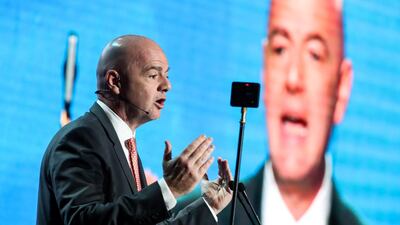Gianni Infantino, the Fifa president, has confirmed the sport’s ruling body are looking in to the feasibility of extending the 2022 World Cup to 48 teams, and staging matches elsewhere in the Gulf.
The competition will definitely be increased from 32 teams by the time of the 2026 event, in Canada, United States and Mexico.
Fifa are, though, considering whether it would be possible to do so four years ahead of schedule, when the competition is played in Qatar.
Infantino believes increasing the size of the first World Cup to be played in the Middle East might mean having to play matches in neighbouring countries.
“The discussion is not anymore, ‘Is it good or is it bad that it goes to 48 teams,’ it is, ‘Can we do it earlier’?” Infantino said, speaking at the Dubai International Sports Conference on Wednesday.
“If you think it is a good thing to have 48 teams in a World Cup, and we will have it in 2026, why shouldn’t we try to have it already four years before?
"It is never too late to do something good, which is why we are analysing whether it is possible to have 48 teams in 2022.
____________
Read more:
Sheikh Hamdan and football icon Cristiano Ronaldo meet in Dubai
Cristiano Ronaldo takes a helicopter ride over Dubai
Cristiano Ronaldo enjoys Dubai's New Year fireworks extravaganza
Cristiano Ronaldo coming to Dubai for Globe Soccer Awards
____________
“It will be quite a challenge, to say it diplomatically correct, to have 48 teams in Qatar. Thirty-two is possible, which is what is going to happen, but if we can increase to 48 and make the world happy, we should try it.
“If we can maybe convince some of the neighbouring countries in the Gulf region, who are very close by, can stage maybe a few games in the World Cup, that could be very beneficial, not just for the region but for the world.”
Infantino believes the ongoing diplomatic boycott of Qatar by countries including the UAE does not preclude the possibility of a cross-border Gulf World Cup.
“I am not naïve,” Infantino said. “I read the news and watch the media, so I know the headlines that there are tensions in this particular region.
“It is up to the respective leaders to deal with them. But, maybe. It is easier to talk about a joint football project than other things.
“If it can help all the people in the Gulf, and all the countries of the world, to develop football, if it can bring a positive message for what football can do, then we should give it a try.”
Infantino is confident there are enough strong nations to make an expanded tournament compelling.
“In the 2018 World Cup in Russia, teams like Italy, Netherlands, the United States and Cameroon did not participate,” he said.
“The quality is there, and participation in the World Cup boosts the participation in a country. It makes the whole country proud. That is why it is important to have more teams.”


